Comments
-
"What is truth? said jesting Pilate; and would not stay for an answer."Although there may be times, like with (a), where the consequent is a fact, — Michael
Oh gawd, now you're doing it.
I don't think it correct to say that the proposition is the fact. — Michael
Which one, then? Please choose, and not equivocate. E.g.
So, "p" is true iff p. What sort of thing is p? — Michael
p the truth-bearing sentence/proposition/consequent, or p some corresponding, truth-making non-word-string?
Truth is relative. There is no absolute truth. — RussellA
An interesting puzzle, though, is how, relative to a language game, truth can be absolute as well as relative.
"Snow is white" is not a fact, because facts are things in the world, and so while "snow is white" represents a fact, it is not a fact. — Banno
So this is what you now say.
"The cat is on the mat" is true ≡ The cat is on the mat
The thing on the right is a fact. — Banno
In light of your new reflections, then, do you endorse the following clarification?
"The cat is on the mat" is true ≡ The cat is on the mat
The thing represented by the sentence on the right is a fact. -
"What is truth? said jesting Pilate; and would not stay for an answer."And what of (II)? — Banno
Am I wrong?
— Banno
Yes. — bongo fury
(II) is nonsense.
Address the other. -
"What is truth? said jesting Pilate; and would not stay for an answer."Am I wrong? — Banno
Yes. (I) is fine, as I say:
That would be basic correspondence theory, yes. My picture 1. — bongo fury
Now read on... -
"What is truth? said jesting Pilate; and would not stay for an answer."You mean that "snow is white" is not a fact, because facts are things in the world, like that snow is white, and so while "snow is white" represents a fact, it is not a fact? — Banno
That would be basic correspondence theory, yes. My picture 1. Something I thought that neither of us agreed with but only one of us was capable of discussing coherently.
Isn't that what I have been arguing? — Banno
Cough, splutter...
"The cat is on the mat" is true ≡ The cat is on the mat
The thing on the right is a fact.
[...]
Now, where in any of this does a sentence correspond to a fact?
What might that correspondence be? — Banno
Perhaps (in the light of your new reflections) you meant "the thing represented by the sentence on the right is a fact"? (Similar to the clarification offered here.)
But then that would be exactly where a sentence does correspond to a fact. (According to the theory being discussed though not espoused.) And the correspondence might be whatever you just called representation. -
"What is truth? said jesting Pilate; and would not stay for an answer."I think the issue is that facts aren’t always things, e.g material objects. — Michael
That's a related issue, sure. I'm less unsympathetic to the notion of corresponding facts that are physical events (objects in the larger sense of regions of space-time). But I'm unsympathetic to the notion of corresponding facts generally, and even less sympathetic to their being smuggled in by systematic equivocation.
It is a fact that unicorns don’t exist, — Michael
I think we agree here.
, but the non-existence of unicorns isn’t a thing that exists. — Michael
Neither is the existence of cats a thing that exists.
Is there a distinction between the fact that unicorns don’t exist and the sentence “unicorns don’t exist” being true? — Michael
What do you think? -
"What is truth? said jesting Pilate; and would not stay for an answer."The T-schema works with a coherence theory, too. — Michael
Hence my quoting Goodman, earlier. And note that my second picture is consistent with the T-schema. Even though it doesn't have whole sentences referring (or corresponding).
This possibility doesn't excuse the equivocating, between strings of words, and alleged things or situations that aren't strings of words. -
"What is truth? said jesting Pilate; and would not stay for an answer."That string of words refers to a fact. — Michael
(My emphasis.)
Exactly. According to correspondence theory in this kind of context.
For me, the words on the right of "iff" in '"Snow is white" is true iff snow is white' point to the grounding fact of snow being white (or not). — Janus
(My emphasis again.)
See, Pie and @Banno? It's not hard not to equivocate, if you don't want to: — bongo fury
Perhaps it isn't quite right to say that the right-hand side of the T-schema refers to a fact. — Michael
Of course perhaps it isn't at all right.
Hence my second picture, just as one plausible alternative. Following up the option that whole sentences don't refer at all.
So what does "snow is green" refer to if not a fact? A fiction? — Michael
Plausibly it is fictional literature. -
"What is truth? said jesting Pilate; and would not stay for an answer."Not at all. I criticised (1).
Specifically, here https://thephilosophyforum.com/discussion/comment/732016 — bongo fury
"The cat is on the mat" is true ≡ The cat is on the mat
The thing on the right is a fact. — Banno
No, the thing on the right of the T-schema is a string of words. — bongo fury -
"What is truth? said jesting Pilate; and would not stay for an answer."
-
"What is truth? said jesting Pilate; and would not stay for an answer."Wittgenstein does that to you! Oui? — Agent Smith
Absolutely not. Wittgenstein is scrupulous.
It's all the arrows. What are they doing? — Banno
Pointing.
And the splotch down the bottom - what's that? The thing-in-itself? — Banno
The (alleged) thing that's not also a string of words.
The thing in my hand is a knife or a piece of metal. We mark the difference by the context. — Banno
Sure. Two words for one thing. No problem. If we're ready to clarify.
The string [snow is white] is a fact or a sentence. We mark the difference by the context, but in addition we can use quote marks. — Banno
Fine, if you would stick to that. Two words ("fact" and "sentence") for one thing (string). But you keep doing one word ("fact") for two things (string and alleged thing that's not also a string). And refusing to clarify, and then basking in people's incomprehension. -
"What is truth? said jesting Pilate; and would not stay for an answer."
-
"What is truth? said jesting Pilate; and would not stay for an answer."You seem to think that (1) and (2) are the same. — Banno
Not at all. I criticised (1).
Specifically, here https://thephilosophyforum.com/discussion/comment/732016 -
"What is truth? said jesting Pilate; and would not stay for an answer."
-
"What is truth? said jesting Pilate; and would not stay for an answer."...and? — Banno
And stop doing it, please. The equivocation.
You don't have to accept the alleged corresponding entities. But stop having it both ways, and basking in people's incomprehension. -
"What is truth? said jesting Pilate; and would not stay for an answer."What's that? — Banno
It's saying, are you pointing the word "fact" at the true sentence or at some alleged corresponding entity? -
"What is truth? said jesting Pilate; and would not stay for an answer."But a wise fellow once said, concerning pointing, — Banno
Word and object have no inherent connection, but only a mystic confuses the two. — bongo fury -
"What is truth? said jesting Pilate; and would not stay for an answer."snow is white - fact — Banno
Equivocal pointing of "fact".
between true sentence and more occult alleged entities. — bongo fury -
"What is truth? said jesting Pilate; and would not stay for an answer."or what it is to point — Banno
https://thephilosophyforum.com/discussion/comment/350131
Word and object have no inherent connection, but only a mystic confuses the two. -
"What is truth? said jesting Pilate; and would not stay for an answer."And as soon as one asks what a fact is, or what it is to point, the equivocation resumes. — Banno
Only for the mystic, addicted to systematic equivocation.
Snow is white. That's a fact. — Banno
"Snow is white" is a sentence, and we point the word "true" at it iff we point the word "white" at snow.
"Fact" is ambiguous between true sentence and more occult alleged entities.
Could we all just drop "state of affairs" and "proposition"? Serious suggestion. Because even the former ends up standing for "sentence". At least with those perhaps disavowing correspondence but prone to having it both ways.
Oh, and "fact", as well. — bongo fury -
"What is truth? said jesting Pilate; and would not stay for an answer."Note that we don't want a string of words to correspond to cat-on-the-mat-ness. — Pie
Who don't? I think they do. I think they're wrong. But not obviously wrong. And they obviously do.
For me, the words on the right of "iff" in '"Snow is white" is true iff snow is white' point to the grounding fact of snow being white (or not). — Janus
See, @Pie and @Banno? It's not hard not to equivocate, if you don't want to:
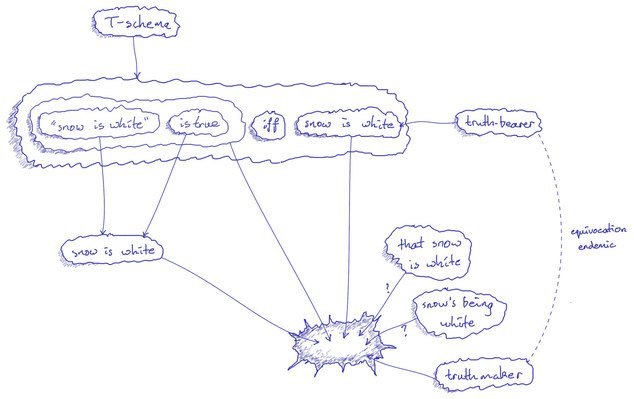
If you don't want to. But mysticism is a hard drug.
The thing on the right is a fact. — Banno
No, the thing on the right of the T-schema is a string of words.
The meaning of 'P' is P. — Pie
Yes, the denotation of a sentence adjoined to quotation marks is the string of words itself.
If 'P' is true, then P is the case, — Pie
But if P is the case, then P.
and P is a piece of the world. — Pie
What is, exactly? A state of affairs corresponding to the string of words? Why not say so, like @Janus? Why the desperate urge to confuse it with the string of words? Do you feel clever when people can't follow your drift? -
The paradox of omniscienceThe issue is what to make of arguments that go like this:
1. P.
2. (1) might be wrong. — Srap Tasmaner
Such as
(p ∧ ¬□p) → ◇¬p
To be fair.
Or even
1. p
2. ¬□(p)
Or
1. p
2. ¬□(1) -
The paradox of omniscience2. It is unacceptable to say that we can have knowledge that is not certain
3. It is unacceptable to say that we can have knowledge that is not necessarily true — Michael
So K becomes a modal operator?
(Or might as well.)
E.g. Kp (or □p) meaning not even secretly not p (or ¬◇¬p).
By analogy with necessarily p meaning not even possibly not p.
Then omniscience is cool, because there are no secret errors. Green zone gone when all p are Kp (□p):
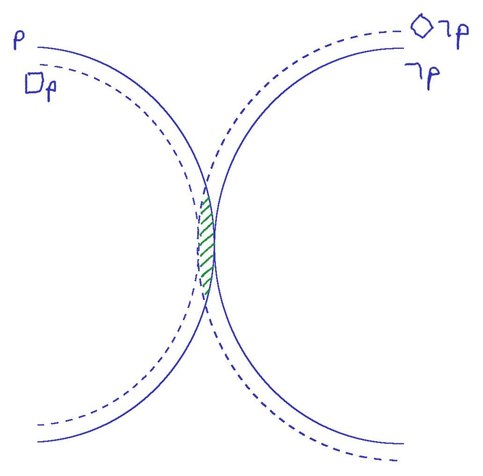
Just as you are observing that omniscience will be cool if there are no possible errors.
Either way, no error problem.
You might object: but my green zone doesn't really contain any errors. It isn't inside the not p circle. So my 'secret errors' (absent omniscience) are no such thing.
But that was my point about your 'possible' errors being unintuitive enough, already. Their being both p and possibly not p is sufficient grounds for worrying at length about relevant angles on "might be wrong". We don't need to assume that modal logic will solve the problem, though. Modality is the problem. -
The paradox of omniscience3. Kp (premise)
4. ¬□p (premise)
5. Kp ∧ ◇¬p (from 3 and 4) — Michael
What about
3. p (premise)
4. ¬□p (premise)
5. p ∧ ◇¬p (from 3 and 4)
Isn't that unintuitive enough?
I mean, do you want it to be true, even if you're not wrong that p?
And what I say is true even if I am not wrong. — Michael
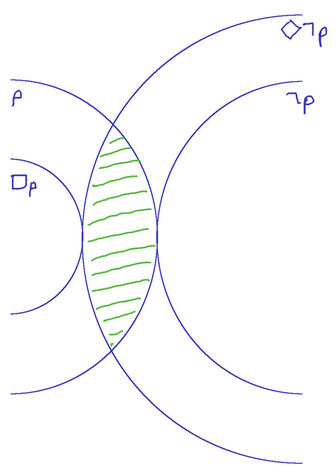
Green zone is p ∧ ◇¬p. Imagine the complement-donuts on the left are un-wound to make their own circles on the right.
5. Kp ∧ ◇¬p (from 3 and 4) — Michael
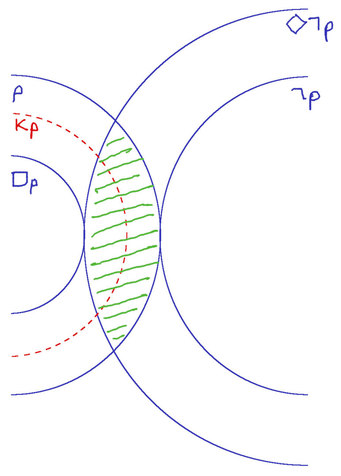
We then conclude that I could be wrong even if I know everything (and assuming that some p is not necessarily true): — Michael
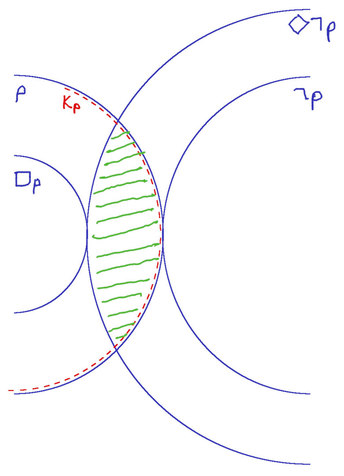
Is it relevant that your K is an ordinary predicate not a modal operator? Sending the modal operator (or rather a corresponding extension) on the same adventure of enlargement would push back the territory of ◇¬p
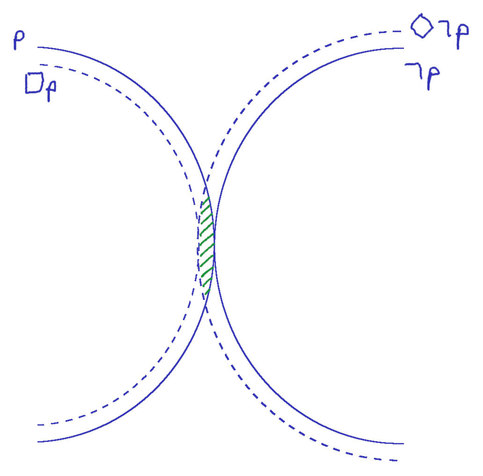
-
John Searle, Consciousness and caluclatorsIt seems that Searle is saying then that consciousness creates the independent fact — TheVeryIdea
Yep. Is that fact.
which I suppose ties in with the quantum mechanics observation effect — TheVeryIdea
I wouldn't know! But this is you not Searle? -
"What is truth? said jesting Pilate; and would not stay for an answer."firstly "is true" looks clearer than either "denotes" or "describes" — Banno
Which is clearer: "word and object" or "sentence and situation"?
You might say the second is more suggestive of 'fit'. Fair enough. That hardly makes it clearer though.
and secondly we can ask if it is true that this "describes" or "denotes" that, — Banno
Sure, and hence the relevance of
Some of the trouble traces back to Alfred Tarski's unfortunate suggestion that the formula " 'Snow is white' is true if and only if snow is white" commits us to a correspondence theory of truth. Actually it leaves us free to adopt any theory (correspondence, coherence, or other) that gives " 'Snow is white' is true" and "snow is white" the same truth-value. — Goodman, Of Mind and Other Matters
Whether a word fits an object is a matter of whether an individual use - say, Humpty's - fits or coheres with the general. -
John Searle, Consciousness and caluclatorsBut am I not interpreting marks on the paper or in my brain when I do the calculation without using a machine? — TheVeryIdea
Sure. With or without.
So no "transition". -
John Searle, Consciousness and caluclatorsE.g. if I add 2 + 2 and get 4 then that is just a fact, a property of the universe — TheVeryIdea
You and your brain interpreting the symbols is the independent fact, not the maths itself. I think. From memory. Quote specifically if I'm wrong on this point, and Searle espouses mathematical Platonism. -
John Searle, Consciousness and caluclatorsthat a conscious entity had to construct the calculator — TheVeryIdea
No.
someone had to read the result from the electronic calculator — TheVeryIdea
And interpret the marks as symbols with meaning, yes. -
"What is truth? said jesting Pilate; and would not stay for an answer."Your drawing gives me some insight, but it'd help to hear more about how you conceive or deal with truthmakers. — Pie
Picture 1 is meant to explain ordinary usage of "truth-maker/truth-bearer".
Not that we have to acknowledge truth-makers corresponding to truth-bearers. — bongo fury
Hence picture 2. Nonetheless, picture 1 is (or so I thought) the usual shared assumption when people use those terms (competently), or when they invoke the use-mention distinction for whole sentences. And in cases like this:
If we jettison apparent nonsense like the world-in-itself...the world is just that which is the case. To me this is not correspondence. There's just use/mention. 'P' is a string of letters. P is piece of a world, a truth (or an attempted truthery.) — Pie
I'm hoping the picture will help us agree whether your P is truth bearer or truth maker or both or neither? What are the odds, I wonder... :grin: -
The mind and mental processesYes, she sees fine, but her memory and imagination do not include visual images. — T Clark
Also, ask her to describe a route, say out of the house to the nearest post box?
And what happens if she were to draw (the post box, say) from memory? -
"What is truth? said jesting Pilate; and would not stay for an answer."P is true is just fancy talk for P. — Pie
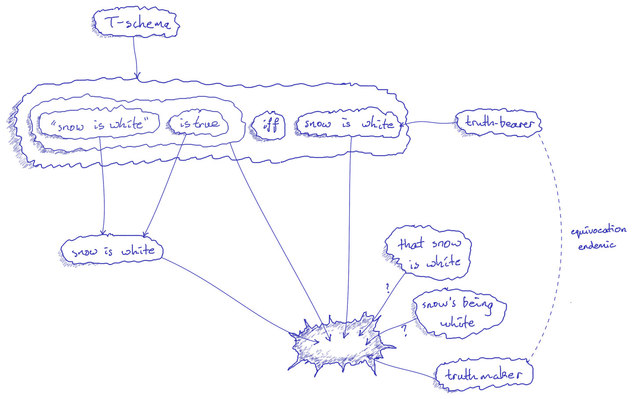
"true" denotes "snow is white" iff "white" denotes snow. — bongo fury
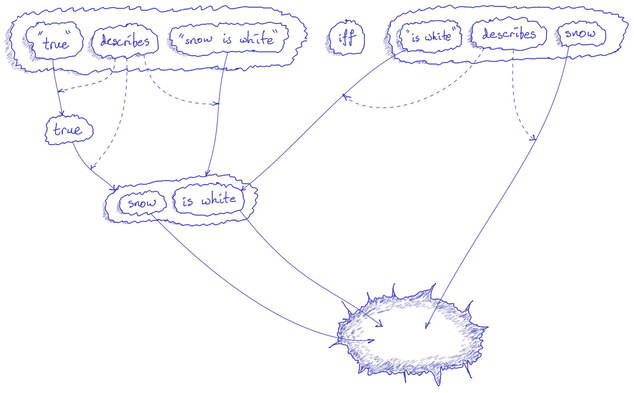
Went with describes, but denotes may less jarring for the naming by quotation.
I may be asking for trouble with the dotted arrows anyway.
Trouble welcome. -
"What is truth? said jesting Pilate; and would not stay for an answer."
-
"What is truth? said jesting Pilate; and would not stay for an answer."
I'm offering denotation (of sentence-parts) as a better way (to examine how language relates or corresponds with bits of reality) than truth of whole sentences. -
"What is truth? said jesting Pilate; and would not stay for an answer."I'd just say that "snow is white" is true if snow is white. — Pie
Yes, which is deflationary, and what could possibly be wrong with that! Well, it's a bit smug, if there's stuff to say about how a sentence refers to other stuff. And mystical, if we end up equivocating between truth-bearing sentence and truth-making state. Which I'm quite sure none of us ever would... -
"What is truth? said jesting Pilate; and would not stay for an answer."My intuition would be that 'true' would merely describe and not denote in that case. — Pie
Same difference. In Quine (see above), Goodman, Elgin.
Denotes, describes, applies to, refers to, points to, ... -
"What is truth? said jesting Pilate; and would not stay for an answer."
Me neither, but I gather he invented sense vs reference, with the latter pointing to true or false as you describe. So?
bongo fury

Start FollowingSend a Message
- Other sites we like
- Social media
- Terms of Service
- Sign In
- Created with PlushForums
- © 2026 The Philosophy Forum







